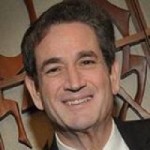By Rabbi Ben Kamin

OCEANSIDE, California — I remember: only weeks after my father died in 1976, our family convened at the house for the annual Seder—the festive banquet of Passover. My father had always proudly led and meticulously directed the ceremonial meal, holding, reading, and chanting from the Haggadah –the book of blessings and folksongs that also includes the grand narrative of the exodus of the Hebrew slaves from Egypt. Like a provincial king, he raised his glass of wine at every appropriate juncture in the service around the carefully organized table. He imperiously broke the outsized communal matzah in half to signify the strenuous human journey to freedom.
It was Passover for me; it is Christmas for some, and Eid Al-Fitr for still others. Regardless of creed, we all have bittersweet memories of a parent or grandparent who was the principal figure at holiday gatherings and with whose voice, face, and hands we associate the occasion.
Naturally, it was difficult to gather for the celebration so soon after we lost the given leader of this hallowed dinner table event. The bitter herbs we always tasted at the meal especially stung our throats and the saltwater, representing the tears of enslaved peoples, drained into our souls. And, at the outset, there was the question of who would now sit in Dad’s chair and conduct the rite. Although I am the elder of three children, I deferred to my brother Sam. Sam was sixteen and his suffering was pronounced; he had especially adulated our father.
Sam solemnly reached into the dining room cabinet to retrieve the Haggadah books with the mournful gravity of a curator in a private museum. He distributed them reverently to all of us, including our sobbing mother. The room filled with an elegiac stillness.
I realized quickly that I had been serendipitously handed a distinct Haggadah, indeed. It was the one my father had used for all those years. Sighing to myself, I saw his handwritten commentary in the book, along the margins. In a quiet shock of recognition, I observed his slanted, Semitic scrawling in the myriad, fussy notes to himself. Dad had, over the course of time, and beholden to his honored responsibility, jotted down an entire personal guide of data, instructions, comments, and directions that he used in conjunction with the text of Passover night.
Later, at one point in the Seder, Sam became momentarily flustered. He wasn’t altogether certain how to proceed. Some Haggadah books are heavily laden with prayers and passages; reasonable deviation and improvisation is permitted and acceptable. Our father wove his own way through the manual while leading us.
Sam looked up and indicated that he did not recall what exactly the next step would be. He glanced around the table, amiably anticipating a suggestion. I looked up from the page in my book and announced: “Sammy! He tells us what to do.” “What?” My brother asked.
“Dad is telling us what to do.” Then, reading from what my father had inscribed neatly in the book, I declared: “NOW TURN TO PAGE 27 AND ASK THE CHILDREN TO SING.”
We in fact did all turn to page 27 and were soon singing: Go down Moses to Egypt-land/ Tell old Pharaoh, let my people go! Even my mother smiled through glistening tears as she sang out loud. Sam, our sister, and I sat in praise; feeling as though our collective shoulder had been tapped from heaven. We realized, as we spiritually took another step across the bridge of grief, that our parents would always leave their handwriting in our lives. With his peculiar, slanted script, our father was still there. All we needed to do was remember him. Not for two days, not for seven, but for always.
*
Rabbi Kamin is an author and freelance writer. He may be contacted via ben.kamin@sdjewishworld.com